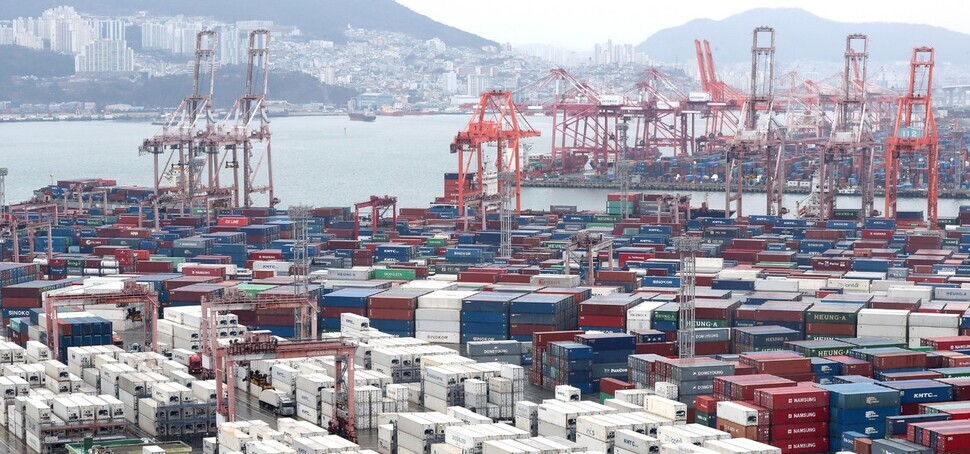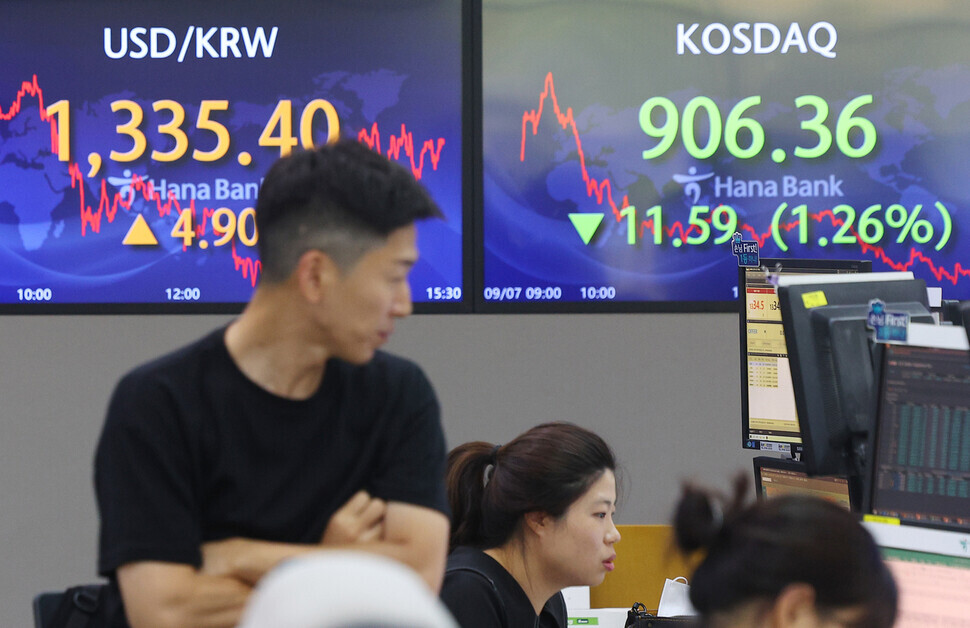hankyoreh
Links to other country sites 다른 나라 사이트 링크
Sinking Chinese economy, rising oil prices may squash hope of year-end economic rebound for Korea

The Korean economy faces two main obstacles to rebounding in the second half of 2023 amid the tandem deterioration of the industrial and price indicators coupled with emerging unexpected variables, including economic jitters in China and rising oil prices. These factors are leading to mounting concern that the domestic economy could face a prolonged slowdown.
Even the government, which had up till now been betting on a rebound in the last six months of the year, appears to have changed its tune.
“The Korean economy is experiencing a slight easing in export contraction, yet external uncertainties, such as economic instability in China, are intensifying,” the Korea Development Institute said in the September issue of Monthly Economic Trends, released on Thursday.
“The Chinese economy faces growing downside risks, such as financial instability in real estate firms and sluggish real estate investment. Furthermore, the increase in consumer prices, driven by rising international oil prices, could partially hinder the alleviation of economic downturns,” the institute also wrote.
Up to this point, the institute had been actively advocating that the worst had passed in the first half of the year. In its June report, it first noted that “there are increasing signs of having passed the economic downturn’s nadir,” before then in July writing, “The Korean economy appears to be navigating its economic trough.”
This reinforced the government’s outlook that predicted that the economy would pick up in the second half of 2023, after a rough first half.
What changed the institute’s opinion was the Chinese economy and oil prices.
“China’s economic turmoil and rising international oil prices are likely to affect domestic growth and prices,” said Jung Kyu-chul, head of macroeconomic analysis and forecasting at the KDI, in a call with Hankyoreh. “Higher prices could dampen consumption and further weigh on the economy if they lead to a rate hike.”

Analysts are watching to see if the government changes up its assessment, which had hitherto been that Korea’s economic slowdown was “easing,” echoing the Korea Development Institute.
“We will further examine upcoming indicators such as exports and China’s economy in early September and adjust tones,” said an official from the Ministry of Economy and Finance’s economic policy bureau.
The “green book” of recent economic trends, which will include the government’s diagnosis, is slated to be released on Friday, Sept. 15.
The Bank of Korea had forecast annual consumer price inflation of 3.5% in 2023, based on the premise that international oil prices will average US$82 per barrel (Brent crude), but if oil prices continue to run high, inflation is also likely to soar.
The rally in international oil prices continues, with US West Texas Intermediate (WTI) crude oil futures prices rising for the ninth straight trading day on Wednesday (local time) and North Sea Brent futures above US$90 for a second day.
Financial markets have also shown signs of an early reaction to the deteriorating situation. Stocks in major Asian and Pacific markets, including China, Japan, Hong Kong and Australia, as well as South Korea’s KOSPI, fell across the board. The surge in international oil prices has raised concerns that high prices and high interest rates could be around for a while longer.
China’s General Administration of Customs stated that the country’s August exports fell 8.8% year over year.
Although the decline was modest, it was the fourth consecutive month of declining exports since May. Due to the weakening of the Chinese yuan, the won-dollar exchange rate closed at 1,335.4 won, up 4.9 won from the previous day, one of numerous signs of volatility in the Korean financial market.
By Park Jong-o, staff reporter
Please direct questions or comments to [english@hani.co.kr]

Editorial・opinion
![[Editorial] Intensifying US-China rivalry means Seoul must address uncertainty with Beijing sooner than later [Editorial] Intensifying US-China rivalry means Seoul must address uncertainty with Beijing sooner than later](https://flexible.img.hani.co.kr/flexible/normal/500/300/imgdb/original/2024/0517/8117159322045222.jpg) [Editorial] Intensifying US-China rivalry means Seoul must address uncertainty with Beijing sooner than later
[Editorial] Intensifying US-China rivalry means Seoul must address uncertainty with Beijing sooner than later![[Column] When ‘fairness’ means hate and violence [Column] When ‘fairness’ means hate and violence](https://flexible.img.hani.co.kr/flexible/normal/500/300/imgdb/original/2024/0516/7417158465908824.jpg) [Column] When ‘fairness’ means hate and violence
[Column] When ‘fairness’ means hate and violence- [Editorial] Yoon must stop abusing authority to shield himself from investigation
- [Column] US troop withdrawal from Korea could be the Acheson Line all over
- [Column] How to win back readers who’ve turned to YouTube for news
- [Column] Welcome to the president’s pity party
- [Editorial] Korea must respond firmly to Japan’s attempt to usurp Line
- [Editorial] Transfers of prosecutors investigating Korea’s first lady send chilling message
- [Column] Will Seoul’s ties with Moscow really recover on their own?
- [Column] Samsung’s ‘lost decade’ and Lee Jae-yong’s mismatched chopsticks
Most viewed articles
- 1[Editorial] Transfers of prosecutors investigating Korea’s first lady send chilling message
- 2For new generation of Chinese artists, discontent is disobedience
- 3[Photo] 1,200 prospective teachers call death of teacher “social manslaughter”
- 4[Exclusive] Unearthed memo suggests Gwangju Uprising missing may have been cremated
- 5[Column] Samsung’s ‘lost decade’ and Lee Jae-yong’s mismatched chopsticks
- 6[Column] When ‘fairness’ means hate and violence
- 7Xi, Putin ‘oppose acts of military intimidation’ against N. Korea by US in joint statement
- 8S. Korea “monitoring developments” after report of secret Chinese police station in Seoul
- 9[Special reportage- part I] Elderly prostitution at Jongmyo Park
- 10[News analysis] Samsung in management crisis due to owner risk